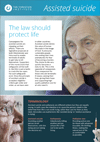A concerted effort to water down the law against assisted suicide has been mounted in the House of Commons with 100 MPs signing a motion calling for a debate on the issue.
The motion follows a number of high profile cases of Britons who have travelled to a clinic in Switzerland to commit suicide.
Last week it emerged that a British couple had become the first to kill themselves together at the facility.
Pro-euthanasia lobby groups are using these cases to call for a change in the law.
But many politicians, doctors and experts in end-of-life care have warned that it would create a dangerous climate for vulnerable people.
The motion, authored by assisted suicide supporter David Winnick MP, says there are “concerns that the Suicide Act 1961 is not fit for purpose” and “calls for a full debate on whether the law should be updated”.
The Government is planning to change the law on assisted suicide, but limits this to extending the law to cover internet sites which offer suicide advice. Gordon Brown, the Prime Minister, has clearly stated his opposition to allowing assisted suicide.
The British Medical Association and the Royal College of General Practitioners have both stated their opposition to allowing physician-assisted suicide.
Around 100 Britons have committed suicide at the Dignitas facility in Switzerland, where assisted suicide is legal. Questions have been raised over the legitimacy of some of the suicides taking place at the Dignitas clinic, with one former employee claiming patients were rushed into making a decision.
Judges recently rejected the appeal of Debbie Purdy, a multiple sclerosis sufferer who wanted a ruling on whether or not her husband would be prosecuted for helping her travel to Switzerland to end her life.
The new motion says any update of the law should be sufficient “to protect vulnerable people whilst distinguishing between assisting suicide and assisting the death of a mentally competent terminally ill adult”.
But the Care Not Killing alliance argues that changing the law for “a minority of clear-headed and determined people” would throw far more people into a painful dilemma.
The alliance says that “for much larger numbers of frightened and vulnerable people there would be the agonising internal debate of whether they ought to remove themselves as a care burden on families struggling to cope with their lives in the middle of a recession”.
Campaigners say there needs to be greater investment in hospices and treatments which are proving highly successful in alleviating pain, and warn that doctors will lose patients’ trust if ending their lives becomes a legal option.

